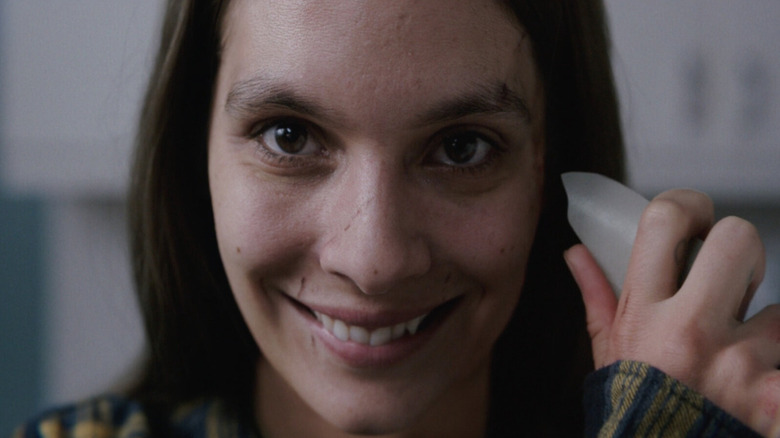
Warning: This article contains spoilers for the film "Smile."
Incredibly, "Smile" now boasts the best second week hold ever for a horror film, dropping only 22% to win the weekend. The runaway success of "Smile" is due largely in part to a high-concept premise that manages to stick the landing during its fiery finale. Even if the jump scares don't always deliver, some of the themes surrounding trauma are compelling enough to show that there is definitely something a little deeper happening behind that scary grin. That may be one of the reasons audiences keep heading back to theaters to see the first big genre movie of the Halloween season.
"Smile" was originally inspired by Parker Finn's award-winning short film, "Laura Hasn't Slept," and the backbone of the main story is sill intact. In the short, a young, petrified woman turns to her therapist to help her get past a frightening, recurring nightmare. In "Smile," Rose (Sosie Bacon) is a hospital psychologist who seeks the help of her therapist (Robin Weigert) after witnessing a patient taking her own life. Rose finds herself in a waking nightmare of sorts when the demon inside her patient transfers to her. From there, everyone close to her dismisses her delusions and refuses to believe her life may be in danger. Rose's former cop boyfriend, Joel (Kyle Gallner), is the only one willing to help uncover the truth.
Rose's predicament spirals out of control, hurling her towards a confrontation with her troubled past during the film's finale. This setup provides a fairly effective means of exploring themes of isolation and mental illness where the demon becomes a metaphor for trauma.
If you or anyone you know is having suicidal thoughts, please call the National Suicide Prevention Lifeline by dialing 988 or by calling 1-800-273-TALK (8255).
Gathering Clues
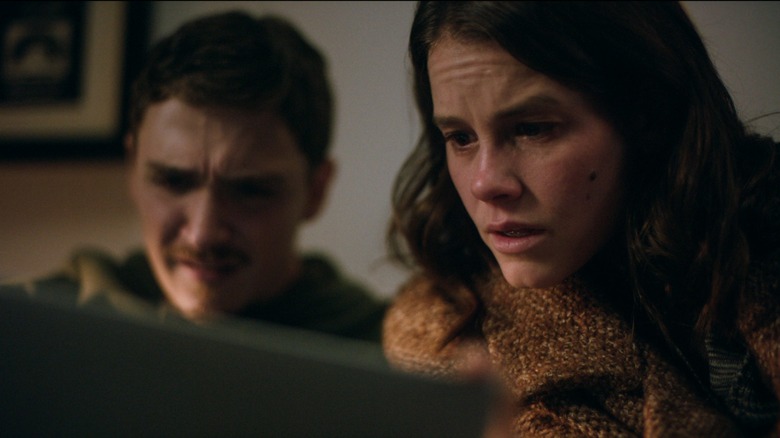
The horror movie "Smile" centers on a supernatural mystery. After witnessing her patient's tragic suicide, Rose discovers that there are others who suffered the same fate. She has the brilliant idea to track down everyone affected by a trail of suicides. With Joel's help, they gather clues in hopes of finding some answers. Their impromptu investigation takes them on a road trip that does wind up unearthing one important detail: Remember, Rose and Joel pay a visit to a prison inmate named Robert Talley, who has managed to stay alive by killing a perfect stranger to fend off the curse. That's not an option for Rose who assumes that if she kills herself with no witnesses present, she can stop the curse in its tracks.
Rose's theory leads her into the final act of the film where she isolates herself inside her derelict family home. Unknowingly, the location Rose has chosen winds up being the very place where her unresolved childhood trauma originated. She has never dealt with her mother's death from a drug overdose, and the demon uses her guilt to finally take control and fully possess Rose. In the chilling final moments, Rose sets herself on fire inside the cabin as Joel watches on in horror — passing the curse to the one person who believed in her.
The Doctor Becomes The Patient
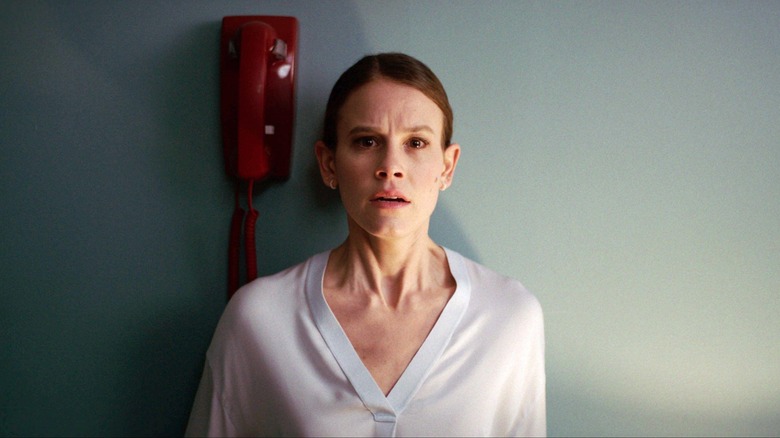
The monster in "Smile" represents different things at different times. Before Rose is forced to face her past issues, her greatest fear is the feeling that she is losing control of reality and may be going insane. Where she was once the capable psychologist helping those in need, now, she's the one who needs help. Early on, the visions of people smiling at her begin to drive her mad and the monster becomes a stand in for the first signs of mental illness.
Rose battles that demon by convincing herself that what she is seeing is real and she is still of sound mind. However, she's already being ostracized by those closest to her and has to realize the horrible reality that she must face this torment alone. Here, the fear of isolation and abandonment come into play, forcing Rose to confront the mother-daughter issues that are at the heart of the film. There's obviously a reason why the smile demon appears as a giant, looming depiction of Rose's Mom during the final act.
One of the most unsettling moments in "Smile" takes place just before that when Rose's trusted therapist, Dr. Northcott (Robin Weigert) reveals herself to be the demon. Her own therapist attacks her and shatters the sacred trust between doctor and patient — it's a shocking moment that represents the ultimate betrayal. Ironically, this helps Rose realize that she may have betrayed her own mother in her darkest time of need. Now, the demon takes its final form and becomes a metaphor for guilt and grief.
Hell Is Other People
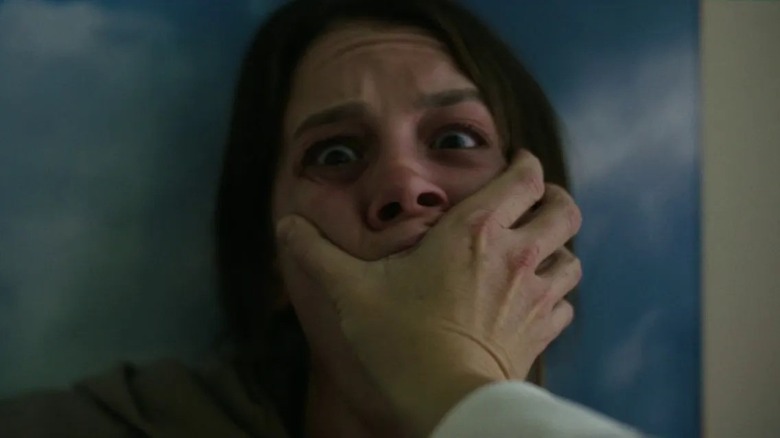
The real horror of "Smile" isn't necessarily the internal agony that Rose is experiencing: it's the dismissive way she is treated by the people around her. Rose's therapist, her fiancé Trevor, her sister Holly, and her colleagues treat her like a pariah when her mental state starts to deteriorate. They push her away, which leads to more severe hallucinations and mental anguish. This is not only a commentary on our collective sense of denial when it comes to dealing with trauma, it also shows how we generally want to get as far away from that pain as possible. The farther we are from it, the safer we are.
In "Smile," any character who gets too close to someone possessed by the demon suffers the consequences. People around the victims, including those closest to Rose, seem to innately understand this. What they don't seem to grasp is just how damaging it is to abandon a loved one in a time of need. The forced isolation only exacerbates Rose's symptoms, causing her to fall even further into a state of mental anguish. Her lack of options ties in directly to her decision to isolate herself in the family cabin during the climax.
Truthfully, if she had a better support group around her, "Smile" might have ended up being a very different horror movie. But at least she would have had a few more options instead of the choice she makes that leads to her ghastly death.
What's Really Behind That Smirk
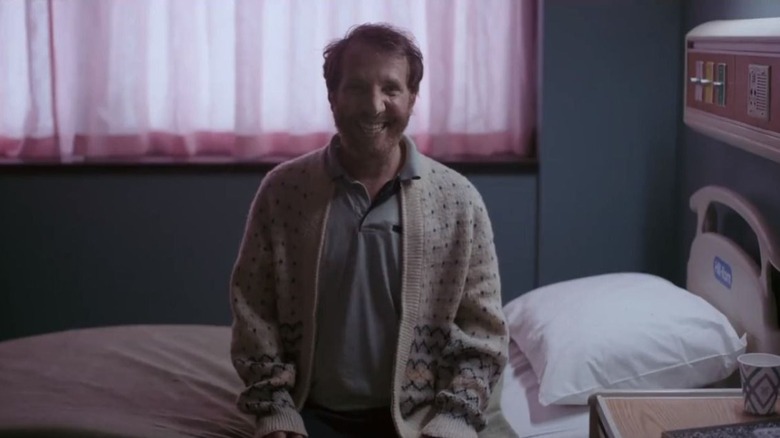
There are two graphic and wonderfully gnarly face-ripping scenes that are really memorable and effective. The first occurs when Rose's colleague Morgan (Kal Penn) suddenly tears the skin off his face just after Rose envisions murdering another patient. Apparently, Rose imagined the whole thing. Then, in the very last sequence, the demon removes its face to reveal its true appearance -- a pale, lifeless entity with a seemingly endless grin. When the creature literally crawls inside Rose and completely takes her over, we're led to believe that this may have actually happened. At the very least, it's real for Rose. For conversation's sake, everything is left ambiguous for the audience to contemplate.
"Smile" tries to be a graphic horror movie and a brooding commentary about trauma, simultaneously. That's commendable, but the jump scares sometimes undermine the film's most important message: We hide real trauma behind a make-believe exterior. The delusions and visions Rose experienced led her to a literal place that allowed her to deal with her family trauma and truly accept her fate. The smile isn't real, it's a disguise that hides the pain underneath. That's why the smile scenes are so eerily effective — because they look so out of place. Ultimately, the wide grin in "Smile" represents the hallucinations Rose experiences that aren't actually real. But those jarring visions help her discover what's really hurting her behind the facade.
In a remarkable turn, going through this horrific journey led to an opportunity to truly heal and grow as a person. With that in mind, it's possible that the mass delusion inside the cabin when Rose sets fire to the demon and escapes shows that she's finally at peace with the sins of the past. She's finally cured, making her suicide all the more tragic.
Maybe a sequel starring Kyle Gallner will help answer some of these open-ended questions. But where's the fun in that?
"Smile" is currently in theaters.
Read this next: The Best Movies Streaming Right Now: Malignant, A Hero, And More
The post Smile Ending Explained: The Painful Truth Behind the Grin appeared first on /Film.
0 Comments